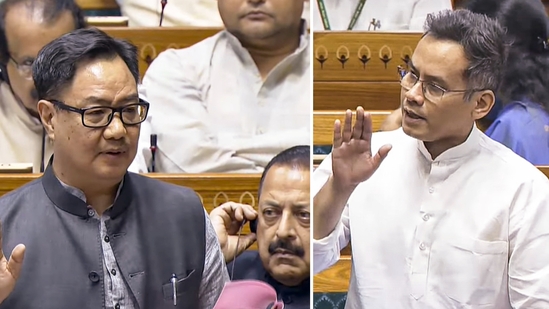New Delhi : The Lok Sabha witnessed intense deliberations today over the Waqf (Amendment) Bill, 2024, introduced by Union Minority Affairs Minister Kiren Rijiju. The bill, aimed at improving the administration and regulation of Waqf properties, has drawn sharp reactions from both the ruling party and the opposition.
The proposed amendments include around 40 changes to the Waqf Act, 1995, such as mandatory registration of Waqf properties with district collectors, changes in board composition to include Muslim women and non-Muslim representatives, and a shift from elected to government-nominated board members. The government argues that these changes will ensure transparency and efficient governance of Waqf properties.
Introducing the bill, Kiren Rijiju emphasized that it was based on extensive consultation, calling it “the largest-ever exercise undertaken by a parliamentary panel.” He stated that over 97.27 lakh petitions and memorandums were reviewed by the Joint Parliamentary Committee (JPC), which also considered inputs from 284 delegations, Waqf boards from 25 states and Union Territories, legal experts, religious leaders, and charitable organizations. However, opposition parties have staunchly opposed the bill, calling it “unconstitutional” and an “attack on minority rights.” Congress leader Gaurav Gogoi accused the government of misleading Parliament, particularly on claims related to the 2013 Waqf Board issue. He demanded that Rijiju provide evidence for his statements regarding the UPA government’s handling of Waqf properties.
The INDIA bloc, comprising Congress, DMK, TMC, AAP, and other opposition parties, has united against the bill. AAP issued a three-line whip to its MPs, while DMK MP Kanimozhi reaffirmed her party’s commitment to defending minority rights, citing a resolution passed in the Tamil Nadu Assembly against the bill. Delhi AIMIM President Shoaib Jamai warned of a nationwide movement if the bill is imposed forcibly, stating that it would mark the beginning of a larger struggle for minority rights.
Reiterating the bill’s importance, Kiren Rijiju and senior BJP leaders, including Home Minister Amit Shah, defended the amendments as necessary corrections to “questionable changes” made by previous governments. BJP Rajya Sabha MP Rekha Sharma claimed the bill is for the “betterment of true Muslims and the country,” accusing Congress of using Waqf laws for vote-bank politics. Meanwhile, NDA allies such as TDP, JD(U), and LJP (Ram Vilas) had earlier expressed reservations but seem to have softened their stance following parliamentary committee modifications. However, BJD has declared its opposition to the bill in the Rajya Sabha, citing unaddressed concerns.
With the BJP-led NDA holding 293 out of 542 seats in the Lok Sabha, the bill’s passage appears likely, though opposition parties continue to push for amendments. Following the Lok Sabha debate, the bill is expected to be taken up in the Rajya Sabha on Thursday. As the government moves forward with its legislative agenda, the Waqf Amendment Bill remains a flashpoint in India’s political landscape, raising questions about minority rights, governance, and state intervention in religious institutions.




